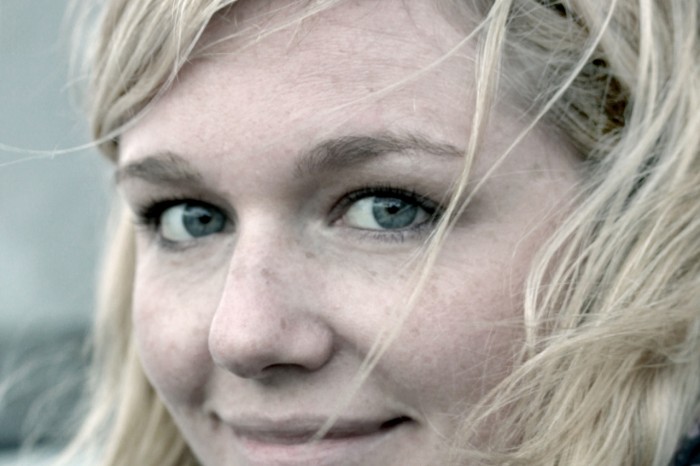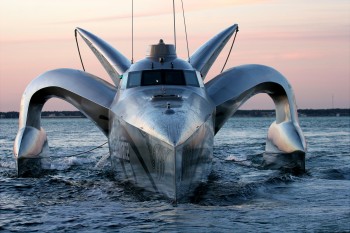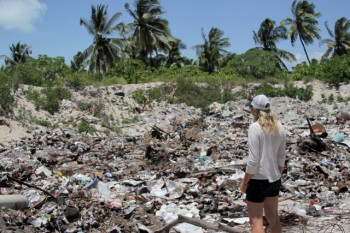Ladies We Love: Environmentalist Emily Penn

Have you ever dreamed about ditching your office job to pursue adventure? Oceans activist and artist Emily Penn has done just that. In the last five years she’s traveled 45,000 nautical miles as an expedition leader, environmental spokesperson, and skipper.
And, at just 23 years old she became founding partner and director of Pangea Explorations, an organization that benefits oceanic studies and exploration via the Sea Dragon ship. Through Pangea, she organized an environmental education program and one of the largest cleanup campaigns in history on the remote islands of Tonga—seventy percent of the population helped to remove more than 120,000 pounds of trash.
And that’s just the beginning. While earning her Sustainable Architecture degree at Cambridge University, Emily received a travel grant to go from England to Shanghai with the pledge that she would use only alternative transportation—a five-week one-way trip by train and horse across Europe and Russia. Then, hooked on human-pace travel, she didn’t board an airplane for three more years.
But how exactly did her passion become her profession?
Emily graduated in June 2008 and lined up a job with an architecture firm in Australia. Still committed to slow travel, Emily jumped aboard Earthrace, a biofuelled powerboat, to take her south. Earthrace had just won the world’s circumnavigation record, so Emily became the Operations Manager for the ship’s global yearlong tour of promoting alternative fuels.
Six months later she reached Australia’s shoreline—but after observing such unimaginable and devastating truths about the state of the Pacific Ocean she decided to postpone her architecture career. Instead, she became an advocate.
Here, we catch up with Emily to learn more about her far-flung adventures
WM: Earthrace was supposed to drop you off in Australia—what was the game changer that inspired you to stay on board the expedition?
Emily Penn: Having stopped at these little islands throughout the Pacific was a ruthless awakening to reality. We passed areas where trash is accumulating—we were woken up by the hull hitting pieces of plastic—and we passed islands with beaches that were collecting plastic, and saw fishing nets that could fit 747 jets inside of them—it was crazy seeing fish coming off of these colossal nets.
When I got to Australia all I could think about was these issues and I was just ready to do something about it.
WM: Then you lived on a remote island in Tonga for six months addressing waste issues—why was it necessary to go there and help?
Emily Penn: Over the last decade the amount of commercial fishing has escalated in Tongan waters. The overpopulation and soil salinization plus a decrease in fish stocks means that there’s a decrease in food.
Now food is being shipped in, but it’s heavily packaged and there’s nowhere for that plastic to go. These islands are completely flat. You can’t create a landfill site, so the only option is to burn it. When we located where the island while sailing was it was because we could smell the burning trash—I couldn’t believe it.
WM: How did you approach those environmental concerns in the island community?
Emily Penn: At first I thought we could just have a clean up, but once I got there I realized that plastic was a very foreign material for them—it literally had just appeared overnight and plastic is so unique because it doesn’t biodegrade. The biggest thing I could give to those communities was knowledge that could provide a shift in thinking and perspective.
Once they knew more, there was such an enthusiasm to do something about it. Over 3,000 people helped with the cleanup, filling eight shipping containers with trash—a large ship had to remove them from the island.
WM: And now you’re working on similar issues in Kiribati?
Emily Penn: Yes, in Kiribati I’m examining the effects of the fish stocks depleting, sand salinization, and overpopulation, which has caused the islands to import food and drinks. They are still pretty disconnected from the outside world and have an incredible environment that’s very rich and can give them what they need, so there’s an opportunity to create positive solutions in the society.
Next year, I’m bringing a team there to help develop infrastructure that can help them become self-sustaining rather than collapsing or depending on aid.
WM: What’s one of the most shocking things you’ve experienced on your oceanic travels?
Emily Penn: One of the most terrifying days was when we saw the 2009 tsunami in Tonga. Imagine being on a tiny island that’s only 12 feet above water level and seeing that the water is gone and knowing that this tsunami is on its way. We were lucky that the tide just came in very quickly and washed out just part of the village, which is made mostly of banana leaf huts.
WM: What did you do after the tsunami hit?
Emily Penn: It actually became one of the biggest lessons I’ve learned from my time in the islands. All of the locals’ boats were washed out to sea or smashed and damaged, so that lifeline was taken away, but it was amazing how the whole community came together to help everyone else. There was this beautiful and resilient mindset that we can help ourselves. Six months later in Samoa there was still debris from the tsunami and the locals said, “The aid money hasn’t come yet, and the bigger the impact looks the more hand out you get.” I realized that system had created a dependency, but you would have never known that the tsunami happened in the remote islands of Tonga.
WM: You said that slow transportation has changed your perspective on traveling. How so?
Emily Penn: When you travel by airplane the transitions occur at a very unnatural pace. I find that slower travel allows you to witness one place merging into another. You have time to take it all in and psychologically prepare yourself for where you’re going and where you’re coming from. And traveling by sea rather than land has provided me with a whole new perspective.
WM: What’s your expedition lineup for 2014?
Emily Penn: In February I’m running an expedition in the Caribbean called “Exploring Mindset.” It’s an intensive workshop aimed for young professionals. We’ll be looking at how we can follow our passions and create meaningful work in a rapidly changing and technological world.
Next summer I’m sailing the Northwest Passage to collect water samples, which will be used to examine CO2 levels and temperature, and monitoring the levels of plastic by gathering plastic pollution samples. And, next November I’m arranging a 20-day, all-female expedition to raise awareness about carcinogens and breast cancer while we research toxins in the ocean and fish.
To check in with Emily about joining an expedition, email her at Emily@panexplore.com.
Read more about “Exploring Mindset” at Panexplore.com and Emily’s One-for-One program at Emilypenn.co.uk.
Kamagra oral jelly Online something to buy the most convenient way. He doesn’t demand from you any actions except how to visit the website. And in separate with goods necessary to you to put the end. To specify your address and to wait for the supplier to whom you will give money.




April 28th, 2014 at 3:44 pm
[…] must take responsibility… And look at the adventures you can have! Great summary here: https://www.womensmovement.com/ladies-we-love-environmentalist-emily-penn/ More info at emilypenn.co.uk and panexplore.com – inspiring stuff through and […]